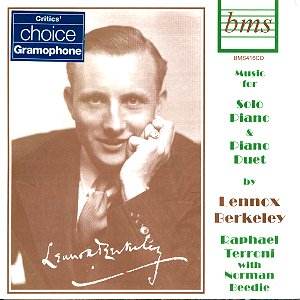It is a cause of some satisfaction that this
exemplary disc of Lennox Berkeley's supremely worthwhile piano
music is being re-promoted in his centenary year. It was originally
awarded 3 stars in the ubiquitous Penguin Guide and included in
the Gramophone Good CD Guide, as well as appearing in the annual
Critics' Choice in Gramophone magazine. If you like the bittersweet
compositions in this genre of Francis Poulenc and Samuel Barber
then you will appreciate this without reservation. Less overtly
British sounding than John Ireland and less romantic or folksy
than Bax or Moeran, yet more immediately approachable than, say
Leighton or Williamson, this music occupies a unique position
in the 20th century canon. Raphael Terroni's performances
of all the solo pieces are superb and he is ably supported by
Norman Beedie in the duets.
The disc begins with the fairly conventional
Six Preludes, written at the end of the Second World War,
and also features the formative Five Short Pieces from
a decade earlier. Neither works are ever less than exquisite and
their simple time signature based titles belie their innate charm.
As in the aforementioned Poulenc, a melodic lyricism is complemented
by a certain quirkiness in some of the rhythms and there is certainly
no lushness in evidence.
The Sonata, written over an extended period
in the first half of the 1940s, is a much more ambitious and serious
piece. I cannot imagine the performance here being easily surpassed,
but both the Adagio and concluding Introduction and
Allegro verge on the genius anyway, irrespective of performer
(I can even imagine Keith Jarrett playing them!). Despite lasting
well over twenty minutes, the work can be heard as an organic
whole, and to these ears is as fine an example of Berkeley's muse
as the best of his works for orchestra. I have a lot of time for
Barber's equivalent piece and this is at least as good, if not
quite as rich in pyrotechnics.
The four hand pieces are also a mixed bunch,
in terms of their scope and vision, from the fairly formal Sonatina
to the almost parodic Palm Court Waltz. If we stick with
the Francophile comparisons, then I am perhaps reminded more here
of a Milhaud like bravura rather than Poulenc or, as mentioned
by the composer himself, Ravel. Whatever, Berkeley can more than
hold his own in the company of these illustrious figures. This
disc is quite rightly regarded as one of the British Music Society's
triumphs and I urge all lovers of 20th century piano
music to seek it out, I am convinced you will enjoy making its
acquaintance.
Neil Horner
Hyperion
Romantic Piano Concerto Series
